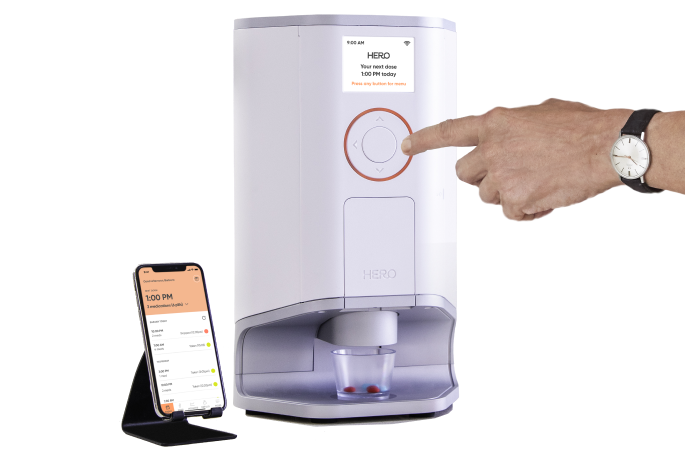Is it time to talk to your doctor? 4 signs your medication regimen isn’t working

Disclaimer: this article is not medical advice. Patients should never alter their medication regimen without speaking to a healthcare provider first.
For many older adults, a medication regimen is a fact of life. As we age, our bodies may not function like they used to. Conditions like hypertension, high cholesterol, and diabetes are common in adults 65 or older. While medication can be used to treat these diseases, how do you know when it’s not working?
Maybe you have an intuitive feeling, something you just can’t put your finger on. Or perhaps you think there��’s a problem but are afraid to ask your doctor. Either way, if you’re uncertain whether your current medication is working, the below four signs may help provide clarity:
1. You feel overwhelmed by too many medications
When your prescriptions pile up and there’s a sinking feeling in your stomach each time you see the handful of pills you must swallow, it might be time to schedule a doctor’s appointment. However, this wouldn’t be your typical visit. Most people only see their doctor when they’re sick, but in this case, the purpose would be to review your medications in order to potentially alter your regimen and, if needed, deprescribe.
Deprescribing, which is the process of reducing the number of medications taken, has many potential benefits, including increased medication adherence and financial savings, and may cause less deterioration of cognitive functions, sleep quality, and appetite. Ask your doctor if there’s any way to reduce your drug load, and also mention what you hope to achieve from your medication regimen.
Many patients assume their doctors know their treatment goals, but that may not always be the case. For example, pharmacist and clinical scientist Barbara Farrell was unaware her 93-year-old patient had a goal to walk across the soccer field to watch his grandkids play. Once Farrell found out, she deprescribed him from cholesterol medicine that caused leg pain, and he was eventually able to achieve his goal.
If you still feel you’re taking too many medications to manage after your visit, consider Hero, an end-to-end medication management service. Hero offers an easy solution to stick to complex medication regimens—their smart device safely stores, sorts, and dispenses up to a 90-day supply of 10 different medications, and the connected app reminds you when to take your pills and when you need refills, plus notifies you if any medication doses were missed. The result is less stress because you don’t have to think about your medicine––Hero does the heavy lifting for you.
2. You're experiencing side effects, allergies, or adverse events
Side effects are more likely when you’re taking five or more medications. However, if you constantly feel sick and question if your symptoms are a result of being under the weather or serious side effects, talk with your doctor or even a pharmacist, as they are also trained to identify drug side effects.
Other signs that you should call your doctor include experiencing drug allergies, which can develop even after taking a medication for years, and adverse drug events, which can happen because of a prescription overdose or medication error.
According to geriatrician Michael Steinman, your risk for adverse reactions increases with the number of prescription drugs you take. This can lead to a prescribing cascade, which occurs when one drug causes a side effect that your doctor prescribes another drug to treat, and that drug causes another side effect that needs a prescription medication. In other words, you start treating side effects with more drugs, which can become a vicious cycle that diminishes your quality of life.
Don’t let these scenarios happen to you. If you feel your medication regimen is causing side effects, allergies, or adverse events, schedule an appointment with your doctor immediately.
3. Your medication seems ineffective
Sometimes, you’ll start a new medication and be surprised when nothing happens after a few weeks. Other times, you may take a medication for years and it suddenly seems to stop working. What do you do in these situations?
While length of time is one potential reason for a drug’s ineffectiveness, consider asking your doctor a few other questions as well:
- Am I taking the drug correctly?
- Are there alternative drugs that may work better?
- Are drug interactions preventing the medicine from being effective?
Sometimes, none of the above questions will get to the heart of the problem. Instead, you may just need a simple dosage change. Dosage is important to both ensure a drug is effective and for medication safety, as the wrong dose can cause harm.
4. You have cost concerns about your medication
Medication can be expensive. Though programs like Medicare can reduce costs for many older adults, sometimes it’s not enough and you’re still left stressed about being able to afford your medicine. When this happens, what can you do?
You may be tempted to take some shortcuts that could, unbeknownst to you, cause yourself harm and make your condition worse. MedlinePlus, a service of the National Library of Medicine, recommends to avoid these actions:
- Reducing your dose by splitting pills in half
- Taking fewer doses
- Taking doses only when you feel unwell
Never make any medication changes until you talk with your doctor. Instead, be sure to ask about generic alternatives at your next appointment.
Generic drugs can be a savior for patients who struggle with expensive medication, as they often contain the same active ingredient as their brand name counterparts and can cost half the price. In other words, you save a lot of money while essentially getting a similar drug.
What can you do if the generic version is still too pricey? Ask your pharmacist if she knows of any programs to reduce medication costs. You can also check out Medicare’s website to see if your state offers pharmaceutical assistance or see if your drug company offers a program to help pay for your prescription.
Get clarity on your medication regimen
Now that you have some idea as to why your medication regimen may not be working, it’s time to take action. Create a medication list that takes inventory of your current prescriptions, write down your concerns, identify potential problem meds, and call your doctor today.
Always talk with your healthcare provider before making any changes to your medication regimen. Your doctor can give you the clarity and confidence you need to stop worrying and find a solution that works for you.
Complex med schedule? We solved it.
Hero’s smart dispenser reminds you to take your meds and dispenses the right dose, at the right time.

The contents of the above article are for informational and educational purposes only. The article is not intended to be a substitute for professional medical advice, diagnosis, or treatment. Always seek the advice of your physician or other qualified clinician with any questions you may have regarding a medical condition or its treatment and do not disregard professional medical advice or delay seeking it because of information published by us. Hero is indicated for medication dispensing for general use and not for patients with any specific disease or condition. Any reference to specific conditions are for informational purposes only and are not indications for use of the device.



